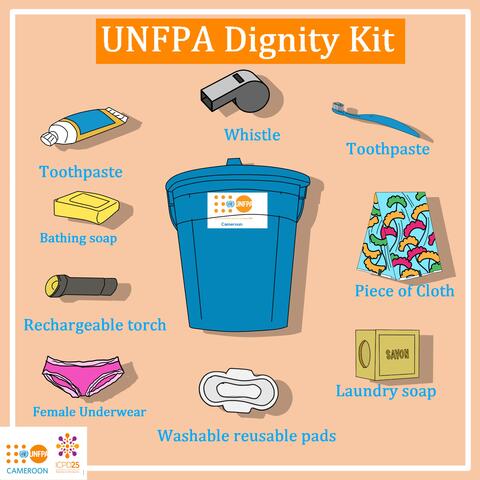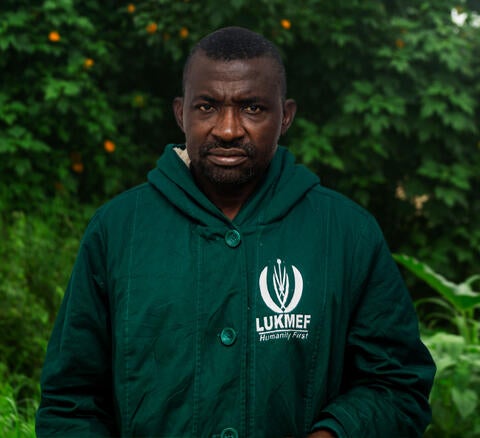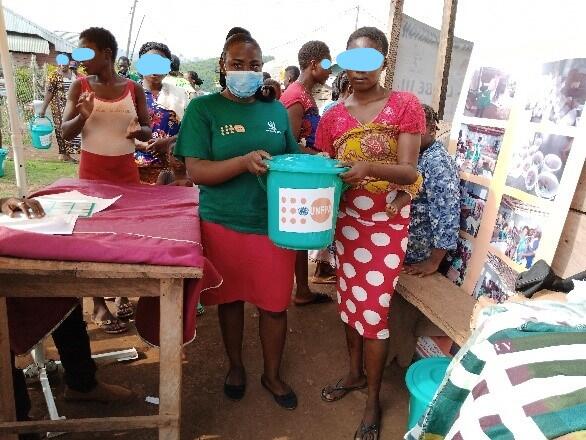
Kits distributed by
UNFPA Cameroon
In times of humanitarian crisis, disaster, and even more so when plagued with a pandemic, it is essential for women to have access to basic hygiene to preserve their dignity. Usually, the context of violent conflict or disaster compels civilians to abandon their homes in search of safety away from the fighting or disaster zone. The haze established at the heart of a crossfire, for example, strips them of the chance to collect essential belongings to ensure their wellbeing away from their homes. Furthermore, it may happen that basic supply to local retailers is usually disrupted. For women, these essential belongings may involve basic hygiene items as essential as a change of underwear or extra sanitary pads.
In such settings, UNFPA through its Implementing Partners, provides Dignity Kits for women and girls’ hygiene. To obtain more insight on the content and role of these kits in their day-to-day work, two UNFPA Implementing Partners: Christian Tanyi, co-founder of LUKMEF International, based in Buea and Fon Nsoh Micheal, of COMINSUD, based in Bamenda, shared their views.
According to Michael Fon Nsoh, Coordinator of COMINSUD, Dignity kits foster women’s self-esteem.
A Dignity Kit can be described as a set of hygiene articles, as well as other items explicitly tailored towards the local needs of women and girls of reproductive age in a particular
community, to help fight shame, stigma and discrimination. “Following the needs assessment done, the Dignity Kit we use in community outreach here in the North West, may contain sanitary pads, underwears, hand soap, a toothbrush, toothpaste, a towel and laundry soap as standard. Then again, specific elements may include a flashlight and a whistle. Our training from UNFPA made us to understand that different contexts have also required kits to comprise of a hairbrush, a headscarf, an abaya and praying clothes. Headscarfs, for example, are a culturally appropriate article essential for women to be able to walk in public places in some muslim contexts.” Michael explained.

Coordinator COMINSUD
Since the start of the socio-political crisis in the North West and South West Regions, UNFPA, through its partners has reached out to displaced women and girls with these kits. However, the needs expressed have been further exasperated with the outbreak of the Coronavirus pandemic in Cameroon in March 2020. A well noted change in context which led to changes in the content as Michael shared: “It is worth noting that the Coronavirus pandemic got us to add more articles in the kit. These are mainly COVID-19 prevention and protection items comprising of hand sanitisers, washeable face masks, bleach and as a hygiene item supplement, extra sanitary towels. This was really necessary to minimise the risk of infection and spread among these persons already living in precarious conditions.”
Besides its rich content, an interesting fact about Dignity Kits resides in its packaging: to ensure that the package also fully serves a purpose to these women and girls, the packaging of the kit’s items is also chosen as per the needs expressed. In this light, a bag, a pack or a bucket could be used. According to Fon Nsoh’s enlightenment on the question, “In contexts where access to water may be challenging, like for the displaced persons here in the North West, the choice of a bucket would enable women to fetch and/or store water at will. Hence, each of these items contributes in preserving the woman’s hygiene and in turn, her dignity. This is essential to maintaining self-esteem and confidence; both important to cope in stressful and potentially overwhelming crisis situations.”
Apart from fostering women and girls’ self-esteem, the question as to whether Dignity Kits could play another role can easily be raised. Christian Tanyi shared his views on this aspect; “Dignity Kits are also a tool to prevent Gender-Based Violence (GBV) thanks to the specific items they contain. Two items which could be taken as examples are the whistle and the torch. The whistle serves as a means for women to raise alarm whenever they feel threatened or unsafe. The torch light, on its part, taking into consideration that in a humanitarian or disaster context, having electricity is usually very difficult, the majority of sexual violence incidents happen at night, mainly because of poor shelter and inadequate lighting within the IDP or refugee camps. Torches help women ensure their safety by being able to see danger from afar even at nightfall.”

Coordinator, LUKMEF
In addition to providing Dignity Kits to it Implementing Partners to combat GBV, UNFPA trains these partners in GBV Case Management, eases the establishment of a referral pathway towards denonciation, provides data for the GBV-IMS, and provides aid in the psycho-social support of survivors. This is to ensure that in difficult contexts such as those described earlier, no one is left behind.
Through the distribution of these essential items, UNFPA, the UN Sexual and Reproductive Health agency ensures that women and girls can fully exercise their reproductive rights and ensure the wellbeing of their bodies.


